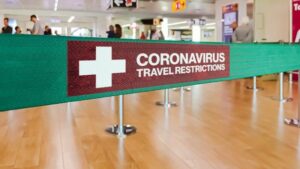
Looking to get away from the cold weather and head to the tropics? Feeling homesick and ready to visit your family in the beautiful islands?
Caribbean islands have reopened to international tourism, but many islands have adopted different restrictions and requirements for vaccinated and unvaccinated travelers, and protocols can change quickly. There are different rules for travel from the U.S. to each Caribbean country.
Health officials have cautioned that travel increases your chances of getting and spreading the coronavirus. They say that unless you’re fully vaccinated, staying home is the best way to stem transmission.
Some local students who are natives of the Caribbean have been vaccinated and say they are afraid of possibly spreading the virus, while others just didn’t want to go through the hassle when it comes to travelling out of the country.
Some international students have been vaccinated, so that they can easily travel back to their home countries to see their families.
But what about those who have not been vaccinated against the coronavirus? Are they able to still travel freely with just a negative test?
What’s the difference with a negative test versus the vaccine?
Tallahassee Community College graduate Taujahnee Richardson had plans to go back to the island of St. Maarten, where she was born. She had visited the island in the summer, un-vaccinated, when the rules were not as restricted. Now, when she wants to travel again during the holidays, it is not as simple as it was months ago for unvaccinated people.
As each island has different rules, there are choices people will now have to make. Below is information on what to know if you still plan to travel, effectively starting during November.
According to travelweekly.com, fully vaccinated travelers will not require a COVID-19 test to enter St. Maarten. Until Nov. 1, current rules remain in place. All visitors must complete the health pre-authorization application through the Electronic Health Authorization System (EHAS), submit proof of a negative COVID test 72 hours before arrival or antigen test done 48 hours before arrival. Once authorization is approved, travelers receive a pre-authorization e-mail that will contain a QR code showing vaccination status and COVID test result.
When trying to return to the United States, all travelers must show proof of vaccination, where a negative test is no longer applicable.
Richardson, who is the mother of a 2-year-old, has doubts about the newest mandates.
“It’s a tough situation,” Richardson saiad. “I don’t think anyone wants to feel like they have to do something they don’t feel fully comfortable in just to live how they used to. I would take the risk depending on the climate of things happening, because being stuck in the U.S. would put a halt to a lot of opportunities of seeing my family.”
Another TCC alumna, Shaquira Davis, had made the decision to stay un-vaccinated. She was pregnant during the time the vaccine was first available. Now that her baby is born, she has had different views as a mother, in favor of her child. She is also from the island of Sty. Maarten, and seen the updated travel bans.
“Before there was not much reason to go back home as I wanted to start my life up in Florida, so I would’ve stayed un-vaccinated, but because baby girl is here, I would want her to meet my family, see my home and learn about my culture straight from the source,” Davis said. “That is the only reason I would consider taking the vaccine.”
A lot of young adults are stuck between staying true to their word and not getting vaccinated, and taking the vaccine so that they can go back home to their families.
Another International student, Termika Casimir, who attends university in The Netherlands, wanted to come to Florida during December, or go back home to the island of St. Maarten. She is unable to travel to either place because she is not vaccinated. She now is considering the vaccine because her travel is at stake.
“It truly depends on the situation and reasoning of wanting to go back home or on vacation to the U.S., but because I like to travel, part of me would risk it and just take the vaccine,” Casmir said. “Here in The Netherlands, a lot of places are restricted if you are un-vaccinated, so now that travelling has made bans, I may do it.”
Some people feel forced when it comes to the vaccine in order to travel. But many individuals who are still un-vaccinated say they may change their mind soon.